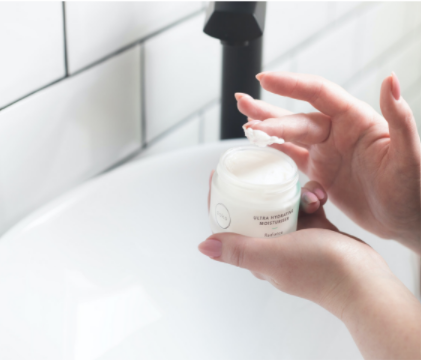Keeping Skin Healthy in Winter
Nourished and hydrated skin can still be achieved in winter’s cold and dry climate.

Photo Courtesy of Poko Skincare on UNSPLASH
A hydrating moisturizer that will serve your skin well this winter season.
February 28, 2022
It’s no secret that the harsh winter conditions in New York can make for serious skin deterioration. Whether symptoms include dry hands, red cheeks,
or chapped lips, everyone’s skin has suffered during the wintertime at one point or another.
According to Healthline, chilly temperatures, lessened humidity, severe wind, and dry indoor heat can deprive one’s skin of its innate moisture. Without moisture, it’s not uncommon for one’s skin to become less healthy and more dry in winter months.
Virginia McKinney (‘23), a member of the Varsity Winter Track Team, is no stranger to being outside during these cold months. “I practice outside five days a week, but I’m usually only outside for 40 minutes to an hour because we do training indoors, too,” McKinney shares. However, during meets, when McKinney is outside for a longer period of time than she typically is for practice, she starts to notice the effects of the outdoors on her skin. McKinney remarks that “sometimes my cheeks get red, especially at meets when we are outside for a couple of hours.”
Charlotte Patricot (‘23) is also a member of the Varsity Winter Track Team. When asked about how the cold weather affects her skin, she responded by saying, “My hands get very dry, and so does my face. My cheeks get super red and my face gets irritated.” Patricot also noted that “I know a lot of people whose faces usually flare up and get really dry.”
To help prevent the cold from having a negative effect on the skin, Dr. Cynthia Yalowitz of Larchmont Dermatology recommends switching to a hydrating body wash. For example, instead of using Ivory soap, try a gentle body wash that has moisturizing components. Dr. Yalowitz also made clear that covering up by wearing extra articles of clothing such as gloves and a hat should not be neglected during the wintertime.
When asked about what’s most important to keep in mind when trying to prevent one’s skin from worsening in the winter months, Dr. Yalowitz’s answer was to moisturize. Moisturizing, especially right after a bath or shower, can improve the skin barrier, which tends to change in winter’s dry, cold environment. To help keep her skin in good condition during the winter track season, Patricot is very avid on moisturizing. “I make sure to moisturize all the time,” she shares.
Another way that Patricot takes care of her skin is by keeping a dehumidifier in her room while she sleeps. “It helps my skin cells retain moisture,” Patrictot says. “My skin always feels moisturized and clean when I wake up.”
Even though sunscreen is often only associated with summer, Dr. Yalowitz stressed the importance of wearing sunscreen in winter as well. “We definitely are keen on telling people to put sunscreen on, especially if they’re fair or are going to be outside for any length of time, or near a window,” Dr. Yalowitz says. “Using it every day is beneficial to help keep the skin healthy and also prevent the aging effects of the sun.”
Intermountain Healthcare recommends removing hot showers from a regular routine. Although it may seem tempting to take a long, hot shower after being outside in the chill of winter, hot showers also have the potential to rid the skin of essential oils. Taking showers that are more warm than they are hot will ultimately be more beneficial to one’s skin. Another important piece of advice from Intermountain Healthcare involves choosing a moisturizer; when selecting a moisturizer, it is important to keep skin type in mind. For anyone who breaks out easily, don’t use petroleum or oil-based products. Conversely, if your skin is exceptionally dry, Healthline advises that a heavier, oil-based moisturizer may be more effective.
While winter can make it more difficult to maintain healthy skin, skin deterioration in these cold months does not have to be inevitable. By being proactive and taking the proper precautions, people can preserve their skin in the winter months.





